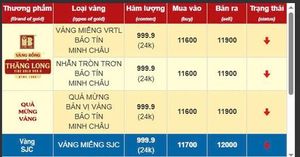In a significant development in South Korean politics, former President Moon Jae-in has been indicted on bribery charges by the Jeonju District Prosecutors' Office. The indictment, which occurred on April 24, 2025, is part of an ongoing investigation into alleged corruption involving Moon and several associates.
Moon was charged without detention under the Act on Aggravated Punishment of Specific Crimes, which addresses serious offenses such as bribery. Alongside him, Lee Sang-jik, the founder of Eastar Jet and a former member of the National Assembly, was also indicted on similar charges of bribery and breach of trust.
According to prosecutors, the allegations stem from Moon's involvement with Lee and a subsequent hiring arrangement. It is claimed that after Lee hired Seo, who was associated with Moon, at Thai Eastar Jet—a company owned by Lee—Seo received a total of 217 million won (approximately $190,000) in salary and housing expenses from August 2018 to April 2020. The prosecutors allege that these payments were part of a corrupt scheme benefiting Moon and his associates.
In a related decision, Seo himself received a stay of indictment, indicating that the prosecutors found insufficient grounds to formally charge him at this time. This legal maneuvering has raised questions about the extent of the investigation and the possible implications for Moon and his political legacy.
The indictment has sparked a wave of reactions from various political factions in South Korea. Supporters of Moon have expressed outrage, suggesting that the charges are politically motivated and aimed at undermining his administration's achievements. They argue that the timing of the indictment, occurring several years after his presidency, raises suspicions about the integrity of the investigation.
Conversely, critics of Moon have welcomed the indictment, viewing it as a necessary step towards accountability for former leaders. They argue that no one should be above the law, regardless of their position or past accomplishments. This sentiment echoes a broader public demand for transparency and integrity in government, especially in light of previous corruption scandals that have plagued South Korean politics.
The former president's office has yet to release an official statement regarding the indictment. However, legal experts predict that Moon will mount a robust defense against the charges, potentially arguing that the payments made to Seo were legitimate business expenses rather than bribes.
This case adds another layer of complexity to South Korea's already tumultuous political landscape. As the nation grapples with issues of governance and corruption, the outcome of Moon's trial could have far-reaching consequences for the future of political accountability in the country.
Public opinion polls indicate a divided response to the indictment. While some citizens are calling for a thorough investigation, others are expressing skepticism about the motivations behind the charges. This division reflects the broader tensions within South Korean society, where political loyalties often intersect with personal beliefs and experiences.
As the legal proceedings unfold, many are watching closely to see how this case will influence the political climate in South Korea. With upcoming elections and a shifting political landscape, the implications of the indictment could resonate well beyond the courtroom.
In summary, the indictment of former President Moon Jae-in marks a pivotal moment in South Korean politics, reigniting discussions about corruption, accountability, and the rule of law. As the nation moves forward, the need for transparency and ethical governance remains a pressing concern for both citizens and lawmakers alike.
![[속보] 검찰, 문 전 대통령 뇌물혐의 기소…옛 사위 특채 의혹](https://thumbor.evrimagaci.org/eO4mbkRJ2-Bhq1JqjV59uC-ml5I=/200x0/tpg%2Fsources%2F447bc5e0-c23d-41f4-a86b-e723f83d4db2.jpeg)



